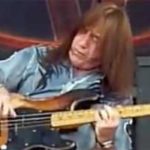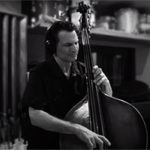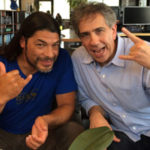Conversation with the man considered by many to be one of the most talented bass players in the U.K. and a force to reckoned with on the London music scene
Exclusive interview with FBPO’s Jon Liebman
August 15, 2011
Andy Hodge is considered by many to be one of the most talented bass players in the U.K. Throughout the ‘90s, Andy became a regular player with many professional acts in the London area, including Johnny Howard, Jack Hawkins, Wonderbrass and The Mike Smith Orchestra & Singers.
In addition to his solid bass lines and dynamic grooving ability, Andy is also known for his impeccable sight-reading chops. He has done countless sessions and jingles in London and spent the better part of a decade performing and touring with That’ll Be the Day stage musical.
Andy can frequently be found in the wings of the London West End Dominion Theatre, filling in for Neil Murray (Whitesnake) in the We Will Rock You Queen tribute show. His latest project is playing in a new fusion band with Russell Gilbrook (Uriah Heep), Jamie Humphries (Brian May Band) and Gary Husband (Level 42, Billy Cobham).
FBPO: Tell me about your musical upbringing.
AH: I don’t come from a musical family, except, perhaps, for my cousin, Simon Gilby, who is an accomplished sax player and now fronts Big Band Metheny. I was always listening to the radio from a very early age. The first song that got into my head was 10cc’s “Rubber Bullets” on a Top of the Pops appearance in the early ’70s. From that moment, I was hooked on singles.
It wasn’t until I was almost 16 that I bought my first bass, a secondhand Columbus Jazz copy, and discovered the joys of rock and pop from the playing side. My listening has always been diverse, but I bought a lot of rock, Deep Purple mostly, and evened it up with a healthy diet of ’80s pop, my heroes being Roger Glover and Pino Palladino.
When I got into jazz, funk, fusion and big band work, I listened to the likes of Stanley Clarke, Jaco Pastorius and John Patitucci. I’ve studied them all at some level and, for me, it always seems to come back to groove and feel, whatever is best for the song.
FBPO: How did you end up choosing the bass as your instrument?
AH: It was through schoolmates forming a band. Even though none of us could play anything at that stage, two of my friends were already taking guitar lessons from a local classical teacher who said he played a bit of bass and could certainly start me off. From day one, he had me reading charts and, within a few months, we were performing Bach Two-Part Inventions together.
At the same time, I was in a local band, Innocence Lost, with Lee Knott and James/Jamie Clarke, who later went on to work with It Bites and The Pogues, respectively. As I began getting a feel for all types of music, bass just felt right to me. I practiced all day, every day, and just loved the whole learning process and applying new ideas in rehearsals and on gigs.
FBPO: London has such an incredibly rich musical heritage. How do you think growing up in that environment influenced you, musically?
AH: Like many cities, London has so much going on musically. I’ve been involved with many singer/songwriters in the capital, most recently Never The Bride, Goran Kay, and James D. Ingram. I’ve also played all the small bars and acoustic venues you can think of. Throughout that process, the general standard of material and ability just gets stronger. I really believe the increasingly cosmopolitan nature of the city is a huge factor in this growing eclecticism and immersing yourself in that kind of atmosphere can’t help but influence your playing.
In my experience, there has always been a wide variety of music in London and I’ve always tried to learn something new from watching any performer. London’s “rich musical heritage” makes me think of The Kinks, The Who, Sex Pistols, Madness, Blur… bands that could only be British. I’m not so sure the city produces such quintessentially British bands any more, but its music scene is arguably more varied, interesting and inspirational.
FBPO: How did you break in to the studio scene in London?
AH: With a crowbar! In 1989 I enrolled for lessons at Samurai Studios under Mark Griffiths and ended up teaching there. I met a lot of people and got a steady amount of work for a good while. From then, and throughout the ’90s, I also picked up a lot of work on UK theatre tours, including Blood Brothers, Lorna Luft, Fame and Wayne Sleep. With so much time on the road, the studio was more of an occasional thing.
Eventually, I did a few sessions at Dream Of Oswald, near Maidenhead, recording albums with Keith James, Naked Days, Judith Silver, etc., and became part of the house band there for two or three years. Along with Keith, Jerry Playle and Brian Greene, I landed a library music contract with EMI Music House and spent a long and highly enjoyable time writing, recording and editing several projects. Plenty of that process turns out to be speculative and not really a great way to make money, but for me, just being in a studio and having freedom to be creative is (almost!) rewarding enough. From there I guess word of mouth helps you get a foot through other doors. I worked on a wide variety of sessions in studios across London.
FBPO: What advice do you have for the young, wannabe session players who have their sights set on London, New York, LA, etc? Things sure aren’t like they used to be!
AH: There are two ways of looking at it: Specialize or diversify. I know, bit of a non-answer, really. Until recently, I think I’ve taken the latter option. Being a good reader, keeping my eyes and ears open and being in love with just playing anything has seen me through a vast array of genres and I am confident in my ability to create the right feel at the right time. In any situation, live or studio, it all comes down to communication with other musicians, so awareness of other players is paramount.
Specializing in one particular genre is what I’m pursuing now. Having always wanted to perform rock, I’ve sometimes felt my commercial theatre and studio work has kept me away from my preferred music. That’s the way my career has gone up to this moment and I wouldn’t change a thing. But now I need to rock.
For anyone wanting to get into session playing, my advice would be to study every type of music you are interested in and get as much experience as you can. Meet players and ask to sit in on sessions and shows. Then soak up as much information as possible.
With so many sessions happening online these days, it’s also highly important to be in a position to record and send files, rather than travel to the studio. I’m slowly getting the better of ProTools right now for that purpose, as well as writing. With so much amazing digital stuff changing the way musicians write and work these days, I don’t think you can remain a technophobe.
FBPO: You were with That’ll Be the Day for quite a long time. I get the sense you were really enjoying it, rather than it viewing it as “just a steady gig.”
AH: TBTD is something of a one-off. It’s been going for over twenty-five years now and still sells really well throughout the UK. It plays in provincial theatres with anywhere from four hundred to three thousand seats, selling out virtually all the time, doing from 210 to 260 gigs each year.
Being really busy with many projects at the time, I turned it down when they first offered it to me in 1998, but joined “for a rest” the following year. It was great fun and because the material changed every summer and also for the Christmas run, the show stayed fresh. I got to play pretty much every tune you can name from 1955 to 1995! Granted, that included a good few songs you may prefer to forget, but it did give me a good ear for what makes a number work with a crowd.
I enjoyed the TBTD gig hugely and the leaping about onstage aspect of it has left me with a far stronger presence in front of a big crowd. You can’t stop me from adding backing vocals now!
I was also involved in arranging a lot of the material each season, which put me in good stead for when I eventually left in 2008, about seven years later than intended, to tour with a tribute show I co-wrote and produced, Dusty Springfield & Friends In Concert. I know I was there for the show’s peak years. TBTD taught me a lot and I do sometimes miss it, but I missed the variety of working with different musicians every day far more.
FBPO: I bet We Will Rock You has a totally different vibe!
AH: They are very different shows! TBTD thrives on its “end of the pier” vibe. It is so much greater than the sum of its parts and people love it for being simply daft fun with a lot of great music.
In contrast, We Will Rock You is a worldwide phenomenon, now in its tenth year in London’s Dominion Theatre, a big venue! It has seemingly limitless energy onstage, with a vast light show, huge sets and an all-star band. Most importantly, it has some of the best rock songs ever written, every one of them loved by the entire audience.
The charts on WWRY are mostly faithful to the original Queen recordings, so you know there are going to be some great John Deacon bass lines to get your teeth into from the outset. I am a solid sight-reader, but working on a show like WWRY is not about sight-reading! To become a dep [sub] there, you have to see the show from the pit and/or wings at least three times. Then your first show has to be under the baton of the principal MD, Stuart Morley, with Neil Murray sitting behind you making notes. No pressure there! But that’s all fine with me. The show has been successfully running so long because everyone involved, from Brian May and Roger Taylor down, has remained aware of keeping standards at their highest throughout the whole production.
Neil’s notes for me were more about tone and attack and maintaining a consistent level from one tune to the next than anything else. I can play hard and with plenty of punch, but Neil’s full-on approach is amazing. Very forceful, but still controlled. We spent a morning going through the pad together after my first show, discussing voicings and clarifying cues to the finest detail. Mostly, I play a Fender Jazz five-string, but I bought a new active Precision American Standard four-string and put a Hipshot on the E to be in the right ballpark, as far as overall sound is concerned, for the show. A few tweaks to the pickup heights, on Neil’s suggestion, made a huge difference for my second performance.
The de-tuner is essential for some of the arrangements, the low open D being a totally different animal to fretting the note on the B string. Some may think it all sounds a bit precious to analyze in that much depth, but with Neil’s career, track record and nine years’ experience on WWRY, I’d be mad not to take on board everything he had to say!
To be honest, I made plenty of my own notes during those viewings. It’s more a matter of doing your homework to the point of knowing the pad inside out and being aware of all the pitfalls and tricky corners approaching. How ever many times you go through the show in your own times, there will always be a page turn or a chorus pedal – Grrr! –waiting to trip you up on the simplest of phrases. There really is no substitute for experience. I still put time aside to go through the whole show at home before I go to the theatre and check that I haven’t forgotten anything in the music. With such great tunes, though, that really isn’t a hardship. I love the exacting nature of a reading gig.
FBPO: Tell me about your fusion band. How are you enjoying playing with Russell Gilbrook, Jamie Humphries and Gary Husband?
AH: It’s still early days working with these incredible guys – working title, “Roast” – as schedules have worked against us lately. Still, though, just thinking about the next rehearsal puts a huge smile on my face.
I’d seen Russell working with Uriah Heep at the first High Voltage festival and couldn’t believe what I was hearing. They’re a ridiculously powerful band and Russell, combined with Trevor Bolder, is nothing short of a miraculous rhythm section. Heep are doing extremely well around the globe right now, promoting their excellent Into The Wild CD, and new tour dates keep being added, so our rehearsal times keep shifting.
We should all be meeting up in the next couple of weeks to look at material. There’s a lot of Jeff Beck on the menu so far, including “Scatterbrain,” “Space Boogie” and “Blast From The East” plus some Dixie Dregs and Billy Cobham’s “Stratus,” which I’m guessing Gary may already have a head start on! There are some crazy songs out there and we intend to pull out all the “fusion” stops and nail them firmly into place at break-neck speed!
FBPO: What’s next in your career? What else would you like to accomplish?
AH: I’d like the fusion project to get a solid run of gigs. It promises to be something special and nailing the material the way we intend to should turn a few heads. After that, who knows where it could lead?
Now that I’m a dep on We Will Rock You for Neil Murray, you could say I’m doing my two favorite things at once: pit work and rock music. With recent work involving the likes of Russell Gilbrook, Pat Lundy (Rise To Remain), Mick Underwood (Gillan, Raw Glory) and Keith Boyce (Heavy Metal Kids) on kit, I now know my style links well with out-and-out heavy rock players, so I’m looking at landing something with a name band soon. Most of all, I want to keep on playing and learning as I go.
FBPO: What would you be if you weren’t a bass player?
AH: Richer! That’s something I haven’t thought about for a while. I can’t really imagine doing anything else. I considered journalism a very long time ago. More recently, I did some research into taking a degree in osteopathy. Writing or show production has always appealed to me and I’m sure I’d always have ended up in entertainment somehow.
I still love driving, despite having clocked up nearly a million miles and well over two solid years of my life at the wheel, but I can’t see me being a cabbie. In the early days, I filled in around gigs delivering hire cars all over the country. Never buy a rental!





